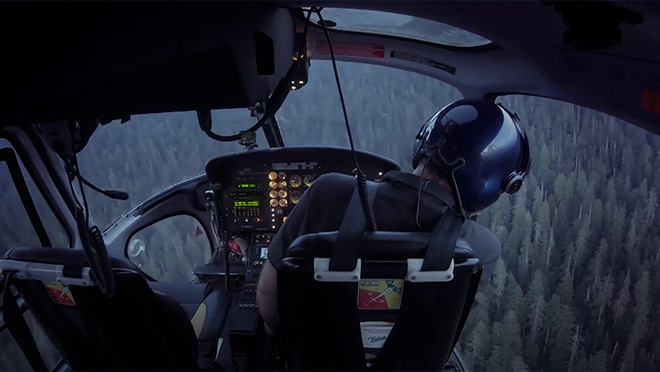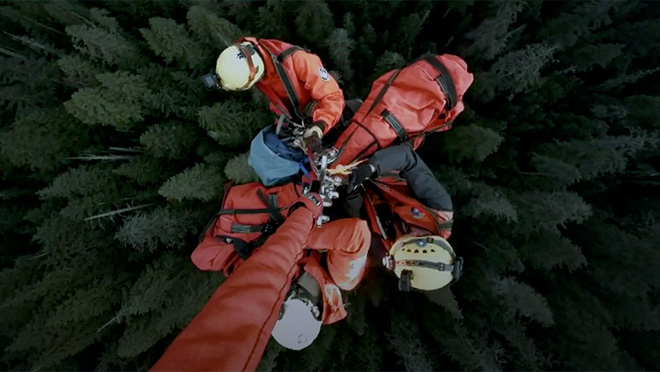A big orange bag, and other outdoor safety tips

BC Hydro engineer offers advice learned from work with North Shore Rescue
Rob Klovance
For bchydro.com
Snacks and water? Check.
Navigation equipment? Check.
Light? Check.
Detailed hike plan left with a friend or family member? Check.
Big orange plastic bag? Huh?...
Scott Merriman's final packing advice for a safe backcountry adventure knocked me for a loop, if only because it's so obviously a great idea. How had I, who has been heading out to trails all year round in a black waterproof jacket, not figured this out before?
"Buy a bright winter jacket, and take an orange plastic garbage bag with you," says Merriman, BC Hydro employee by day and volunteer search manager for North Shore Rescue in his spare time. "I always have one in my pack, because it's super useful. You can crawl into it to shelter from the weather, and it's great to signal to those who might be looking for you."
Mountains and trails may be a short drive away for so many of us in B.C., but far too often we're either ill-prepared, or we dress as if we don't want to be found. And we get lost or injured often.
In the past year, B.C. search and rescue teams have responded to more than 1,900 calls, a record number likely due to the increased number of people opting for outdoor adventures during the COVID-19 pandemic. And Merriman is a member of B.C.'s busiest search and rescue team.
North Shore Rescue team lead Mike Danks told CBC News earlier in January that he attributes the increase in searches to social media and the number of people, often inexperienced in the outdoors, setting out to enjoy it on their own.
"In doing so, they're getting into more technical terrain, and they're losing their cell signal as well," Danks told the CBC.
So it's time for a refresher on staying safe in the outdoors, year round. And few are better to provide advice than search manager Merriman, who talked to me on the heels of a tragedy still fresh in his mind. In mid-January, a 21-year-old solo snowshoer from Ontario died after getting lost, then sliding off the trail into a deep gully.
The woman's last phone call was to a friend in Toronto instead of calling 911.

BC Hydro engineer offers advice learned from work with North Shore Rescue
Bad weather, navigation that goes awry, or just bad luck in the form of an injury, can put outdoor adventurers in great peril. The good news is that your chances of getting lost in the first place are reduced, and your chances of being found increase dramatically, if you're properly prepared.
"It really comes down to 'You don't know what you don't know'," says Merriman, who has been with BC Hydro for over 13 years, and with North Shore Rescue for eight years. "It's a phrase we often say, because you can be in a potentially dangerous situation and have no idea."
It's for that reason that Merriman highly recommends that anyone heading into the B.C. wilderness in winter take an avalanche course. Courses are available from the likes of the Canada West Mountain School and Backcountry Avalanche Awareness.
An electrical engineer, Merriman pays the bills by doing power quality investigations for BC Hydro. But when I chatted with him in January, he was in the midst of a two-week shift on standby as search manager for North Shore Rescue. What was promising is that, so far this winter, his team had been called out to only a couple dozen incidents.
The majority of North Shore Rescue's searches happen in the summer, when the backcountry is flooded with hikers and bikers. Merriman says that, regardless of the time of year you head out into the outdoors, you should refer to North Shore Rescue's What to Bring list, which includes these 10 essential items, with details for each:
- Light
- Signalling device
- Fire starter
- Warm clothes
- Pocket knife
- Shelter
- Water and food
- First aid kit
- Navigation
- Communications/cell phone
"The mentality people often have is that 'It will never happen to me'," says Merriman. "I say, prepare for the worst, but expect the best. You never know when the weather will change, or when you might twist an ankle and can't get home."
And that's why Merriman emphasizes the need to tell someone exactly when and where you're going. While a cell phone is helpful, cell coverage can disappear within 10 minutes of leaving the parking lot at a trailhead.
"It's not good enough to say, 'Hey, I'm going for a hike on Seymour'," he says. "Tell someone where you're going on that hike. The big challenge for us is figuring out where people actually went, and that search area gets pretty big when you don't have the detailed plan of where someone meant to be."
Also keep in mind that search and rescue teams across B.C. are comprised of volunteers like Merriman and that donations are vital to ensuring training, assistance and equipment are available for teams. Donate today at the BC Search and Rescue site.
Related stories: